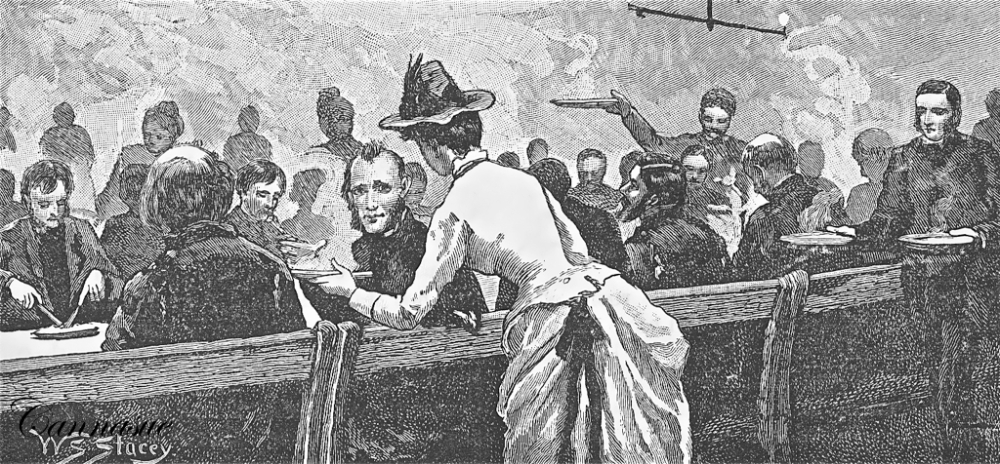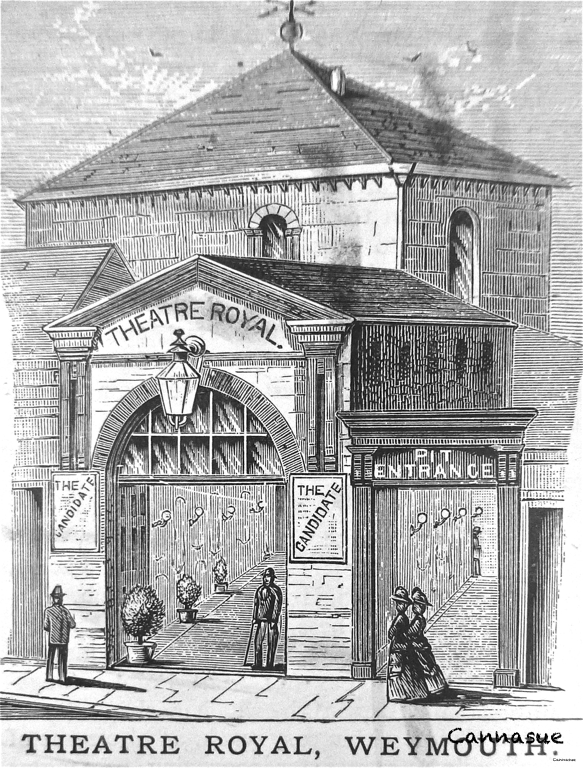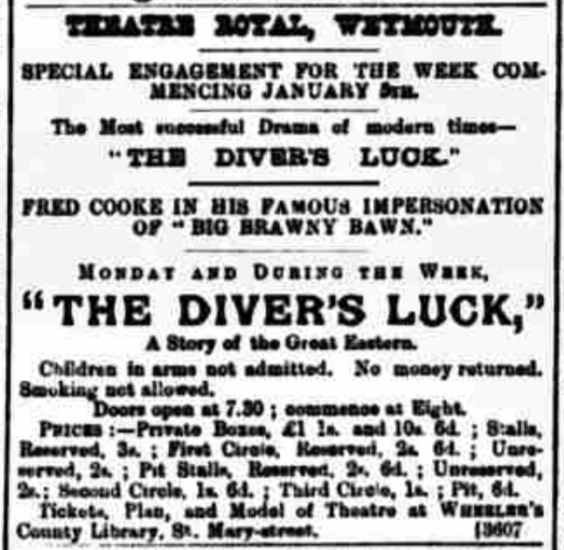Will admit I’ve not been active on here recently, but my conscience getting the better of me I’ve been scrolling the old Newspapers again looking for local fodder. For this post I’ve chosen the Southern Times and Dorset County Herald dated 3rd January 1891.
What follows reveals a snippet of late 19th century commercial and social life in Weymouth over that Christmas/New Year period as reported.
We’ll start with a touch of Christmastide shenanigans.
A well respected local businessman, Thomas Hole, was stood in the dock garbed only in a sheet and rug, much to the amusement of the court’s public attendees, in stark contrast his hands and face were blackened. Thomas was accused of being drunk and disorderly at the Crown hotel.

The night before P.C. Lakey had been summonsed to gather up this over-festive fellow and found him laid on the ground outside the Crown, stark naked.
Thomas’ bizarre explanation? ‘He simply blacked himself as a mummer.’

Why he was dressed, or rather, not dressed, wasn’t explained. Nor why his alleged mummers costume was missing or even his fellow minstrels.
For his New Year’s Eve shenanigans Thomas was fined 10 shillings including costs.
***
Unlike todays media, local advertisements were printed in prime position on the front page.
I suspect many of you local folk will possess antique objects with this good old name immortalised on. Sparkling water was all the rage it seems as Weymouth could brag many a firm filling fizz into bottles.
Their premises were in Clifton place, a narrow road which runs between Park street through to Gloucester Mews.

Then we come to a name that is synonymous with Victorian Weymouth photography and portraits. Seems he also had many other sidelines on the go and boasted plenty of high brow patrons.
An article further on in the same paper not only extolls his virtues, NEW DEPARTURE IN PHOTOGRAPHIC PORTRAITURE; it positively glows brightly when describing how he’d secured
the right of use of the new flash light, now creating so great an interest, which enables him to ensure highly successful portraits of his sitters at any hour or on the dullest day, either at their own homes or at his studio, with equal success.
Van Dyke Studio was run by Harry Wheeler, a man with fingers in many profitable pies!

Reporters waxed lyrical of Harry’s artistic talents. He may well be proud of the work he has turned out, for we doubt whether it is possible for any photographer, either in London or the provinces to show a better collection.
Harry and Mary Marie Wheeler and their veritable brood (must be something in the Weymouth waters!) lived along Frederick Place. When Harry passed to the dark room in the heavens (1895) his fingers in pies scheme had obviously worked their magic because he bequeathed to his wife and son, Frank Augustus Wheeler, “dealer in fine arts” the princely sum of £4494 13s 11d.
***
And now to what we Brits love discussing best…the weather!
Seemingly that winter Weymouth experienced exceptionally severe weather which enabled the townsfolk to don their skates once more. There had been some excellent skating, more especially at Chafey’s Lake, on which a considerable number assembled.

Lodmoor on the other hand held little water meaning skating space there was, therefore, somewhat limited.
***
The Weymouth LIBERAL SMOKING CONCERT went down a storm. Held in the Jubilee Hall, around 1,500 persons were present, two thirds of whom, however, consisted of boys, who followed the example of the men and smoked most freely, also spending a considerable amount in coffee, buns &c.
During the three hour long concert it was reported that Mr Grace’s sketch “Parties we Meet” was exceedingly good and created much amusement. Sergeant Thomas from the Nothe barracks gave a clever exhibition on the horizontal bar with and with clubs. What would a concert have been without music dispensed by the bandsmen of the Volunteer Artillery. Mind you, it’s a wonder anyone could see anything on stage with all that smoke!
***
Another form of popular entertainment was of course the theatre, of which Weymouth could boast a fair few.
(Oh how that seems so exotic nowadays, the freedom to just go out and be entertained or socialise.)
According to the Southern Times’ very non-descriptive write up
THE DIVERS LUCK-This remarkable drama which embodies a story connected with the Great Eastern steamer, is to be be produced at the Theatre next week, commencing on Monday. The piece is one of great interest, and cannot fail to afford much entertainment to Weymouth and Portland audiences.
A couple of observations, I love the theatre’s pit entrance and how children in arms not admitted.
***
Portland too had it share of festive season news. Mr Healey of Castletown poor old donkey was somehow cut in half on the Weymouth to Portland railway.
Miss Bessie Coombes entertained young Portlanders with a magic lantern show at fortune’s Well Wesleyan schoolroom.
More troops arrived to join the 2nd Royal West Kent Regiment, they were met by the fife and drum regimental band and marched up through to join their comrades at the Verne Citadel.
Serving men of both land and sea were all invited along to the Soldier’s & Sailors Institute for Christmas day, where they were served a hearty meal and provided with a little present each.
Of course Portland wouldn’t truly be Portland without a shipwreck. The three masted, 480 ton screw steamer Thames of Penzance went ashore on Tor Rocks just past Chesil cove. she was spotted in trouble by coastguards of Chesil station.
***
To end on a high note, on New Year’s Day, one man who was a great benefactor to the town, the once local MP Sir Henry Edwards.
This philanthropic gentleman was someone that the town council, not surprisingly, were eager to cultivate and maintain his patronage. Sir Edwards paid for his 26th gathering of old folk of 60 and upwards at Weymouth’s Jubilee Hall.

Four hundred and forty two elderly men and women were seated at thirteen tables beautifully laid out for them, complete with floral decorations. With the weather as bitter as it was the vast hall was heated by gas stoves. Catering was provided by Mr & Mrs W Page and their staff, the food being cooked in local baker Mr George’s ovens just a few doors away.


The united ages of the guests totalled no less than 29,787 years.
The Mayor presided over the gathering, and the duties of carvers were undertaken by a number of townsmen who are always ready and willing to discharge this pleasant task. The waiting at table was admirably carried out by a large band of young ladies wearing caps and aprons, who most zealously attended to the wants of those at their respective tables.

Grace was said by the Mayor, at the conclusion of which the huge joints of beef and mutton were vigorously attacked by the carvers, and the old people who seemed to have the very best of appetites made joint after joint rapidly disappear. After meat came an almost unlimited supply of excellent plum puddings, of so large dimensions that a dozen or so slices did not seem materially to lessen their proportions.[…] Beer for those who preferred it, and aerated waters for others, were freely dispensed.’
Following a few more obligatory prayers and speeches, oranges, tobacco, snuff and coffees were handed out. Festivities were accompanied by music from a local band, more than likely one of the resident regimental bands. Someone had even written a song to be sung by one and all to the tune of Old Lang Syne, praising the wealthy gent for his generosity.
Proceedings were wrapped up by a series of what was supposedly meant to be short speeches (though they in fact took up numerous column space in the paper) from a whole list of orators including the Mayor and Mr Robens, who read out a letter from their benefactor, Sir Edwards.
On departure each guest was presented with a caddy containing a pound and a-half of tea that had been grown on Sir Edwards own plantation.
***
Wyke had their own version of philanthropy.
The Misses Pigou kept up their annual custom on New Years Day of giving away to many of the parishioners, about midday, roast beef and plum pudding, to be consumed at their home. In addition to this these three ladies were not unmindful of the Christmas season, and many received other presents from them.
The three Misses were Catherine, and her spinster daughters Mary Eliza and Catherine Louisa Pater, Henry Clarence Pigou was the Rector of Wyke at the time.

Was Weymouth of old really so different from todays?
*********
Want to read a bit more local gossip?
Don’t think this is just a book about the military in Weymouth …which of course it is…but it contains so much more.
Stories of Weymouth and Portland families, tales of harsh conditions for convicts and local quarrymen in the Portland dust bowls.
The doings of local bobbies in their fight to keep soldiers and residents on the straight and narrow.
There’s disasters, deaths, murders, suicides, and on somewhat a happier note marriages and love affairs.
Who knows, you might even find one of your relative’s tales within its pages.
You can find it stocked in Weymouth Museum and Nothe Fort book shops.
Please shop locally if possible to support our town.
Failing that it is available on Amazon







Hi,
Thank you for once again for taking the time to do your research and then keep us all informed. I have received a lot of your emails but one in particular surprised and I suppose shocked me. It was regarding a man named Gunstone who treated his wife and children with total disregard and cruelty. I think that this man was my great grandfather. When I was born in Sussex in 1948 three of my grandparents had already died and the fourth was suffering from dementia. My dad never spoke about his dad and it was years before I found out that his name was Rosslyn Hubert Walter Gunstone and that he had been born in a place called Purewell in Christchurch? He was a stonemason and travelled around Hampshire and Sussex before he died I think during the Second World War.
You said in your email that the wife of this terrible man who beat her and then took up with a younger woman ended up in prison for failing to take care of her children! Have you any idea what happened afterwards or do you know anybody else with this information. I live in France so it is difficult to visit the area and of course I haven’t been able to get home for almost a year. I would appreciate any information although I realise that it was all a long time ago but the information that you sent was a huge surprise to me,
Kind regards,
Tony.
Sent from my iPad
>
LikeLike
Morning Tony, I’m sorry it was such a shock. I’ve had more than a few doing my own family research, including elopement, bigamy and murder! I only started mine after both my parents died, they were reluctant to participate, and the found the reason why. I’ll see what more I can find out. It might take a couple of weeks, but if you don’t hear from me by then give me a nudge.
LikeLike
Morning Tony, did you want to send me your e-mail so I can send you more info. What do you have so far?
LikeLike
Hello Sue, Did you get my email re Weymouth Pubs? if not I can re send,
Mick Davis (not sure how to contact you)
>
LikeLike
Hello Mick, yes thanks. I did respond to you, but maybe it went into spam mail? sue
LikeLike